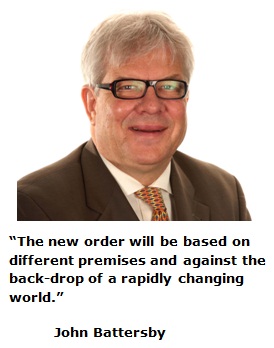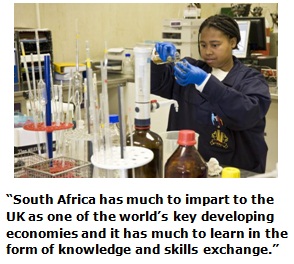 ReConnect Africa is a unique website and online magazine for the African professional in the Diaspora. Packed with
essential information about careers, business and jobs, ReConnect Africa keeps you connected to the best of Africa.
ReConnect Africa is a unique website and online magazine for the African professional in the Diaspora. Packed with
essential information about careers, business and jobs, ReConnect Africa keeps you connected to the best of Africa.



 There is an inexorable shift of economic power from the so-called developed world to the high-growth economies of the developing world, and it’s time for a whole new relationship with Africa, says John Battersby
There is an inexorable shift of economic power from the so-called developed world to the high-growth economies of the developing world, and it’s time for a whole new relationship with Africa, says John Battersby
The Minister of Mineral Resources Susan Shabangu has been talking to the heads of mining companies in London for the past four years or so and she was here again recently for the G20 Africa investment conference.
But her engagement with investors was different this time – or at least the emphasis had changed from explaining why investor fears about policy changes would not materialise to encouraging a deeper dialogue aimed at getting the mining companies to acknowledge the devastating legacy of apartheid and take joint responsibility for a plan to restructure the industry and the broader economy.
Whether dealing with the extraction of minerals or the challenges of infrastructure development, Shabangu called for a collaborative approach and the building of partnerships rather than the mere pursuit of self-interest and the “enclave mentality” that went with it.
“The exploitation of this vast mineral base requires responsible investment in the continent – not based on exploitative principles centred solely on expectations for unrealistic rates of returns…...mining is a long-term investment and not about quick wins,” she told the conference.
The relationship between South Africa and Britain was forged in an era of empire and colonialism. The social, cultural and historical ties run deep and it has become a cliché that seven out of ten British citizens have some form of connection with South Africa either through family, friends, business or exchange.
The transformation of South Africa with the release of Nelson Mandela from 27 years in jail and the first democratic election in 1994 after protracted negotiations has challenged both the relationship and the premise on which those ties were based.
In every sphere – economic, diplomatic, political, social and cultural – a new relationship is emerging from the old. But birth is a painful process and this is going to be no exception.
The Ministers point was that South Africa’s leaders cannot afford to gloss over the history of dispossession and suppression of black South Africans. There will have to be deep structural changes to create a lasting foundation for a new just, inclusive and accountable order.
The changes will take place within a democratic order which guarantees individual rights, has an independent judiciary and is committed to full inclusion and accountability. But the changes need to be structural, deep and sustainable.
The new order will be based on different premises and against the back-drop of a rapidly changing world in which the old order of “us and them”, north and south, east and west is breaking down and giving way to a globalised world order based on shared problems, give-and-take, partnership and shared solutions as the driving force.
There is an inexorable shift of economic power from the so-called developed world to the high-growth economies of the developing world. Many African economies are growing faster than those in Europe and some European countries – such as Spain, Greece and Portugal - now have higher levels of unemployment than some African countries.
Many of the world’s leading companies have emerged from the so-called developing world and the point was reached some years back where the emerging nations’ contribution to global growth outstripped that of the so-called developed nations.
Africa, with its rich mineral and natural resources, growing trend towards accountable government, economic transparency and co-ordinated development is increasingly being seen as the last frontier of the global economy. The continent has long been regarded by high-growth economies such as China, India, Brazil and Turkey as a key economic partner.
Africa still has a long way to go in terms of developing strong regional markets and becoming an integrated continental market but when it achieves more acceptable levels of integration (30% instead of 10%) it will be the world’s third largest functioning market after China and India.
South Africa, with its new-found status as member of BRICS along with China, Russia, India and Brazil – is a bridge not only to Africa but also between Africa and the high-growth economies of the developing world.
Through its membership of the G20 group – itself a reflection of the changing world order – South Africa works closely with the UK and other high-growth economies in several spheres which include dealing with global economic and financial crises, meeting the challenge of the Millennium Development Goals or the financing of African infrastructure to take the continent to the next level of development.
 South Africa has much to impart to the UK as one of the world’s key developing economies and it has much to learn in the form of knowledge and skills exchange to build sustainable base for rural development and sound health and education systems.
South Africa has much to impart to the UK as one of the world’s key developing economies and it has much to learn in the form of knowledge and skills exchange to build sustainable base for rural development and sound health and education systems.
In order to renew the relationship between the two countries in a sustainable way, there needs to be a deeper understanding of the legacy of the apartheid system and how deep the roots of inequality reached in the exploitation of natural and mineral resources, the allocation of land, the segregation of residential areas, in education, mobility and in every aspect of daily life.
This legacy will take generations to address in a way that will ensure true equality of opportunity and level playing fields for all sections of the South African community. But the moment of mutual need between government, business labour is intensifying as the old formula for balancing domestic delivery with the needs of international investors is unravelling.
There needs to be a dialogue between investors which acknowledges this legacy and seeks a joint solution to address the human and developmental backlogs which stand in the way of a sustainable democracy taking root.
It is these deep-seated inequalities that fuel the strikes and unrest in the highly symbolic mining sector and across the economy.
Investors will need to find a way of engaging with South Africa in a way that not only ensures good profits and future growth for their companies and shareholders but also benefits the communities in which they operate and thus enables them to become part of making South Africa a better place for all who live in it.
The inequalities that South Africa has to grapple with on a daily basis are mirrored in the broader international community where the super-rich get richer and the gap between the rich and the other two-thirds which lives close to the breadline gets remains a gaping chasm despite the efforts of the Millennium Development Goals and initiatives by the G20.
The juxtaposition of those inequalities in South Africa are more brutal than in most other countries where the rich can live without having to confront poverty on a daily basis.
Sustainability has become the key word in evaluating trade, investment and developmental opportunities in South Africa. It is also becoming a key factor in ensuring sound business in the corporate sector.
This dual requirement of sustainability bodes well for a future meeting of minds between government and business within the framework of a social accord with labour which will ensure a road map to a sustainable future for South Africa, Africa and the global community.
John Battersby is the UK Country Manager for Brand South Africa
Image: Chris Kirchhoff, mediaclubsouthafrica.com
